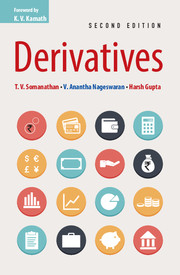Book contents
- Frontmatter
- Dedication
- Contents
- List of Tables, Figures and Boxes
- Foreword
- Preface to the First Edition
- Preface to the Second Edition
- Acknowledgements
- Part–I Introduction
- Part–II Forwards and Futures
- Part–III Swaps
- Part–IV Options
- Part–V Other Derivatives and Derivative-like Instruments
- Part–VI Accounting, Taxation and Regulatory Framework
- 17 Accounting and Taxation
- 18 Infrastructure for Derivatives Trading
- 19 Regulation of Derivatives Trading: An Introduction
- Part–VII Portfolio Management and Management of Derivative Risks
- Bibliography
- Index
18 - Infrastructure for Derivatives Trading
from Part–VI - Accounting, Taxation and Regulatory Framework
Published online by Cambridge University Press: 02 August 2019
- Frontmatter
- Dedication
- Contents
- List of Tables, Figures and Boxes
- Foreword
- Preface to the First Edition
- Preface to the Second Edition
- Acknowledgements
- Part–I Introduction
- Part–II Forwards and Futures
- Part–III Swaps
- Part–IV Options
- Part–V Other Derivatives and Derivative-like Instruments
- Part–VI Accounting, Taxation and Regulatory Framework
- 17 Accounting and Taxation
- 18 Infrastructure for Derivatives Trading
- 19 Regulation of Derivatives Trading: An Introduction
- Part–VII Portfolio Management and Management of Derivative Risks
- Bibliography
- Index
Summary
Derivatives can be traded on exchanges, or OTC. In principle, not much infrastructure is required for OTC trading – all it requires is for two parties to agree. Exchanges originated as informal below-the-tree marketplaces for hedging and speculating. In earlier days, an exchange was often merely a known marketplace in contrast to isolated one-on-one transactions, and did not afford one the counterparty protections of a modern clearing house. Nonetheless, the public and open nature of the transactions meant that the credibility and reputation of both parties were involved and this offered some protection against default.
Exchanges are essentially the first layer of regulation for exchange-traded derivatives. Modern exchange trading generally reduces counter-party risks because the two parties are shielded from each other by the exchange's clearing houses, their margin requirements and regulatory safeguards. For example, A and B can decide on a wheat transaction for next year directly with each other (that would be a forward contract) or through an exchange (a ‘futures’ contract). In India, forward contracts in commodities outside an exchange are, unless intended for and closed by delivery, generally illegal. Since the financial crisis of 2008-09 there has been a global push towards promoting exchange-based trading above OTC trading (bringing it closer to the long-standing Indian position). The infrastructure requirements of an exchange and its various stakeholders are acquiring greater significance.
Yet, non-exchange contracts will always remain, primarily because the standardised terms of exchange traded derivatives may not match the specific needs of certain hedgers. The biggest advantage of OTC markets for participants is that terms can be customised.
Apart from this ‘genuine’ reason for using OTC contracts, another motivation for treating contracts as OTC (even when customisation is not needed) is regulation. OTC contracts may be legal but exempted from the regulatory requirements applicable to exchange-traded transactions, in many countries. Therefore, large but semi-standardised ‘OTC’ markets have grown in certain countries and for certain instruments. Many of them use a large number of standardised terms agreed upon by industry participants. Such contracts, though nominally are over the counter, have exchange-like characteristics: they are OTCs for the purpose of avoiding government regulation, but in practice an informal ‘exchange’ or association works.
- Type
- Chapter
- Information
- Derivatives , pp. 282 - 292Publisher: Cambridge University PressPrint publication year: 2017



